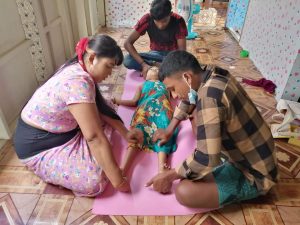 Thanks to the collaboration with the Don Carlo Gnocchi Foundation, we were able to start up a Community Based Inclusive Development program in Dala, Yangon outskirts. Here the story told by Teresa Sassu, their coordinator.
Thanks to the collaboration with the Don Carlo Gnocchi Foundation, we were able to start up a Community Based Inclusive Development program in Dala, Yangon outskirts. Here the story told by Teresa Sassu, their coordinator.
The collaboration with Don Carlo Gnocchi Foundation (FDCG) started after a field visit in Myanmar in 2018. After this first visit we started a partnership, thanks to this, FDCG managed in 2020 to send a new coordinator in Myanmar, Teresa Sassu. She managed to open the chance to start up new collaborations in disability field. After helping us improving our approach to disability in projects we were already implementing in Taunggyi and Yangon, they helped us to start up new Community Based Inclusive Development (CBID) programs in Kyaing Tong and in Yangon’s outskirts.
After starting up the Dayamit Community College and some food distributions in Dala, in Yangon’s outskirts, our local staff met a big need in disability’s field. The collaboration with FDCG was then really precious in order to meet this need in a very rapid way.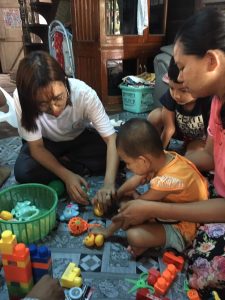
We report here Teresa’s words.
“United intervention NHI-FDCG in Dala started in April 2021, only 2 months after the military coup. We started with a first mapping and assessment identifying families with a member with disabilities, with the aim to start up activities who could meet theire rehabilitative, educational and social inclusion needs, as foreseen by the CBID approach indicated by WHO.
The rehabilitative project started at Dayamit Community College, in order to spread awareness among students in the school regarding people with disabilities. Many of them could in that way know different realities, thanks to the fact that they could see people with disabilities, physical or mental, and observe their rehabilitation path managed by a physiotherapist and a Meziere therapist.
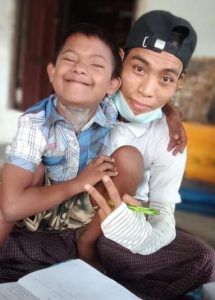
First months were useful to start awareness and sensitization about some health conditions and some professional roles (such as physiotherapist), besides of an holistic and multidisciplinary approach (typical of FDCG) to a work “with” and “for” people with disabilities.
Since March 2022 there is a separate rehabilitation center in which there is a Rehabilitative Team composed by a physiotherapist, a Meziere therapist and 3 promotors. This is a team made by enthusiastic and dedicated people who are putting their selves on the first line for contributing to their own community.
Weekly, the 18 beneficiaries of the program are receiving sessions of physiotherapy and special education, often together with other children living nearby and who perfectly understood the meaning of proximity and caring of each other. It’s really precious to observe their first steps towards inclusion, and also to can rely on a community who is starting to understand which kind of intervention we are trying to develop.
Concretely we are providing therapeutic sessions and groups activities with children and families every week, we are also providing medical referral and home visits. Meanwhile, we are organizing professional and motivational training for the operators we are working with and we are starting new collaboration with other local organizations, in order to grant a clinical assessment to our beneficiaries.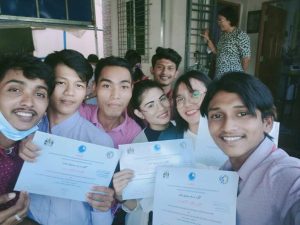
There is a lot of work to be done, especially in terms of mentality and approach to disability: since taking in charge of the person, by assessing his needs, to exploring his potentialities in order to help her living a dignified and full life, as much as possible.
One thing is very interesting in Dala’s project: all promoters are boys! Usually, in Burmese society, only women are families caregivers. This could certainly be a small sign of mentality’s change, disrupting the stereotype who says that caring is a female chart.
At the moment we are facing lots of challenges, especially for the political instability who doesn’t allow us to work as we want, because of military’s controls, the high number of checkpoints and the interdiction of moto in the district. This is really limiting our work and stimulate us to find new strategies to face the transport problem.
In spite of this, thanks to our motivation, to the strong group’s spirit and the dedication of our team, we are keeping on supporting and implementing activities we thought for the next future, starting from clinical assessments and awareness meeting with parents who will take place in July. “
We can’t add anything, but saying good luck to Teresa and the whole rehabilitative Team for this new challenge, we are sure that their work will ameliorate the life of lots of people!
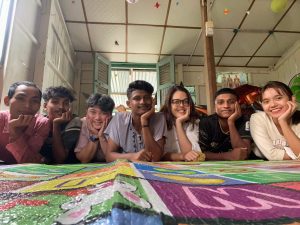

Recent Comments